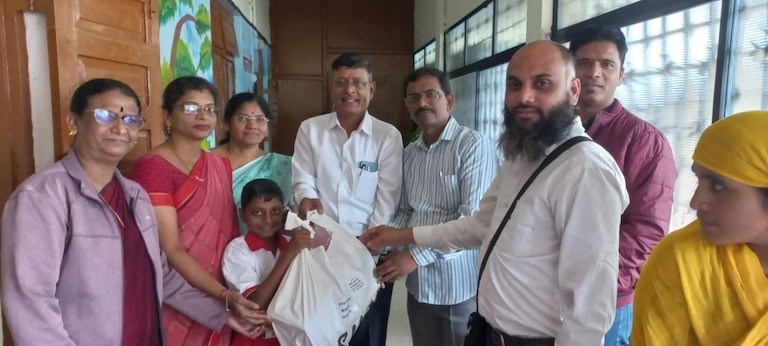Pimpri Chinchwad Municipal Corporation’s (PCMC) transformative School Essentials Direct Transfer Program provides an impactful example of ensuring quality access of the education essentials. Palladium supported PCMC in conceptualizing and implementing the initiative. The program, aimed towards providing essential school kits to all the municipal school students, combines innovative technology with governance to tackle issues of transparency, efficiency, and accountability. This program leverages the e-Rupi platform, a digital payment solution of National Payments Corporation of India (NPCI), to ensure optimum utilization of the funds.
In previous years, funds for PCMC municipal school essentials were directly transferred into parents’ bank accounts. While this approach simplified the disbursement process, the Education Department realized that around 40% of the funds were only used for the intended purpose, while the remaining fund was utilized by the parents for unknown reasons.
To tackle this challenge and ensure that all students have access to quality school essential kit compromising of school bag, shoes, raincoat, water bottle, and other stationary items, an innovative solution of e-Rupi launched by Hon. Prime Minister, Shri Narendra Modi was explored and implemented as a step toward digital transformation to ensure effective utilization of the funds.
The implementation of this program has been a resounding success. In its first year, more than 51,000 students from municipal schools received their school kits. By switching to e-Rupi, the program eliminated fund misuse and optimized the utilization of INR 19.90 crore.
A key factor in the program’s success was the collaboration between PCMC and Palladium. Palladium provided end-to-end support, including conceptualization and developing the implementation plan and monitoring framework, providing transaction advisory for empaneling vendors, onboarding transactional partner (Bank of Baroda) and ensuring compliance with e-Rupi requirements. Their focus on maintaining high standards in the quality of school supplies further enhanced the impact of this initiative.
Shri Shekhar Singh, Commissioner of PCMC, emphasized the transformative power of the initiative, stating, “This year’s successful DBT implementation has enabled us to provide high-quality school supplies to our students. Through e-RUPI’s digital payment process, we optimized the use of funds, allowing students to benefit directly. We are confident that, moving forward, we will continue refining the process for faster and more efficient implementation, ensuring every student benefits from such initiatives.“
India has over 1.5 million government schools serving more than 130 million students. Replicating the School Essentials Direct Transfer Program through e-Rupi across all states could transform the way education resources are distributed. By addressing issues of fund misuse, streamlining processes, and ensuring quality, this model has the potential to improve educational outcomes across the country. The benefits of this system are undeniable, it enhances transparency by eliminating middlemen and fund diversions, ensures cost efficiency through centralized procurement, and prioritizes inclusivity by delivering essentials directly to students, even in remote areas. Moreover, by leveraging India’s widespread mobile network, such programs can be implemented at scale, making it a practical solution for states not only looking to provide access to quality school essential but for other subsidies as well.
Amit Patjoshi, CEO of Palladium India, emphasized the replicability of this model, stating that “It offers a robust solution for government bodies and municipal corporations nationwide. By integrating technology with stringent quality checks, this program can ensure that various subsidies or direct benefit transfers can be effectively made available for beneficiaries, ensuring optimum utilization of the funds.”
The success of the School Essentials Direct Transfer Program in Pimpri Chinchwad highlights the transformative potential of such tech-based initiatives in ensuring equitable access to education. Programs like School Essentials Direct Transfer offer a way to maximize the impact of such direct benefit transfers to students.
Disclaimer: This media release is auto-generated. The CSR Journal is not responsible for the content.


